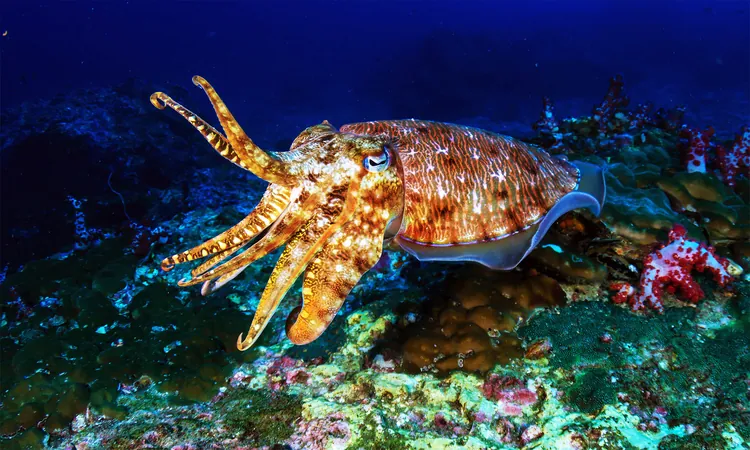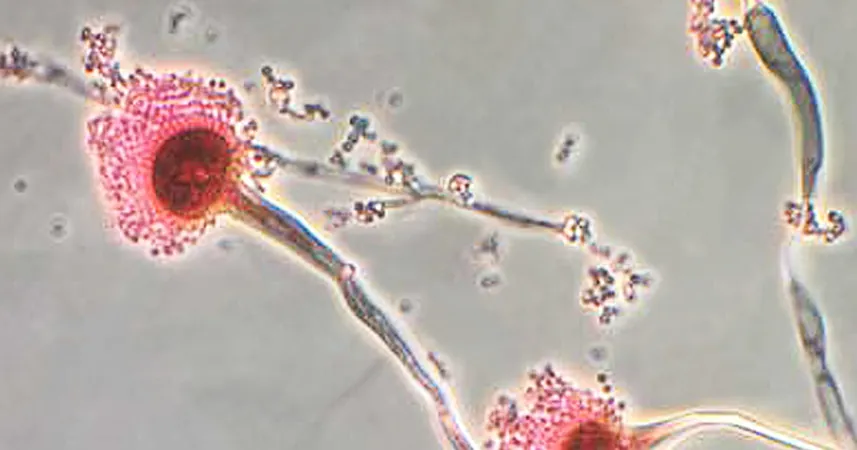
Cuttlefish Show Shocking Intelligence in Marshmallow Test—What Scientists Discovered Will Surprise You!
2025-05-22
Author: Jia
We often think of patience as a trait found only in humans or certain animals, but recent research reveals that cuttlefish, those intriguing marine creatures, possess surprising cognitive abilities. A new study has demonstrated that these soft-bodied hunters can exercise self-control and delay gratification in a manner previously only observed in smart vertebrates.
The Marshmallow Test: Cuttlefish Edition
For decades, scientists have explored the fascinating relationship between patience and intelligence, primarily in humans and primates. Yet, the cognitive landscape of invertebrates remained largely uncharted—until now. In an impressive adaptation of the classic 'marshmallow test,' cuttlefish were faced with a choice between a quick snack of shrimp or a tastier live grass shrimp if they could wait.
A Test of Endurance and Intelligence
In this underwater version of the test, researchers created a setup where cuttlefish could see both food options through a barrier, allowing them to strategize their choice. Some cuttlefish grabbed the ordinary shrimp immediately, while others displayed remarkable self-control, holding off for more than two minutes to claim the better prize. Wait times ranged from 50 to 130 seconds, astonishingly similar to those seen in intelligent birds like parrots and crows.
What Makes Cuttlefish Stand Out?
Lead author Alexandra Schnell from the University of Cambridge highlighted the study's groundbreaking nature, stating that it is the first documented link between delayed gratification and intelligence outside of the primate lineage. The findings not only showcase cuttlefish as more than just simple hunters but as creatures capable of complex decision-making and learning.
Learning and Adaptation
In addition to the marshmallow test, researchers further probed the cuttlefish’s learning abilities. They trained the animals to associate specific colors with rewards and then reversed the expectations. The results were telling: those cuttlefish who adapted quickly to the color shifts were also the ones that displayed greater self-control. This connection between impulse control and learning ability offers fascinating insights into the cognitive functions of cephalopods.
Why Do Cuttlefish Wait?
Cuttlefish typically spend much of their time camouflaged and waiting to pounce on prey. Research suggests that their ability to delay gratification likely evolved as a survival strategy. By waiting for higher-quality food, they optimize their foraging while minimizing exposure to predators. Schnell notes that every time they expose themselves in pursuit of prey, they face significant risks.
The Broader Implications of Their Intelligence
These findings not only elevate the status of cuttlefish in the animal kingdom but also challenge our perceptions of intelligence itself. While scientists have focused on larger-brained creatures, the study shows that advanced cognitive behaviors can emerge across diverse organisms. Cuttlefish, alongside octopuses and squids, highlight that intelligence can manifest in various forms, tailored to the environmental challenges each species faces.
The groundbreaking study appeared in the journal Proceedings of the Royal Society B, pushing the boundaries of our understanding of cognition in invertebrates.


 Brasil (PT)
Brasil (PT)
 Canada (EN)
Canada (EN)
 Chile (ES)
Chile (ES)
 Česko (CS)
Česko (CS)
 대한민국 (KO)
대한민국 (KO)
 España (ES)
España (ES)
 France (FR)
France (FR)
 Hong Kong (EN)
Hong Kong (EN)
 Italia (IT)
Italia (IT)
 日本 (JA)
日本 (JA)
 Magyarország (HU)
Magyarország (HU)
 Norge (NO)
Norge (NO)
 Polska (PL)
Polska (PL)
 Schweiz (DE)
Schweiz (DE)
 Singapore (EN)
Singapore (EN)
 Sverige (SV)
Sverige (SV)
 Suomi (FI)
Suomi (FI)
 Türkiye (TR)
Türkiye (TR)
 الإمارات العربية المتحدة (AR)
الإمارات العربية المتحدة (AR)